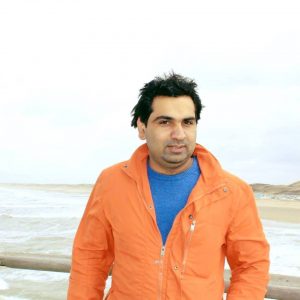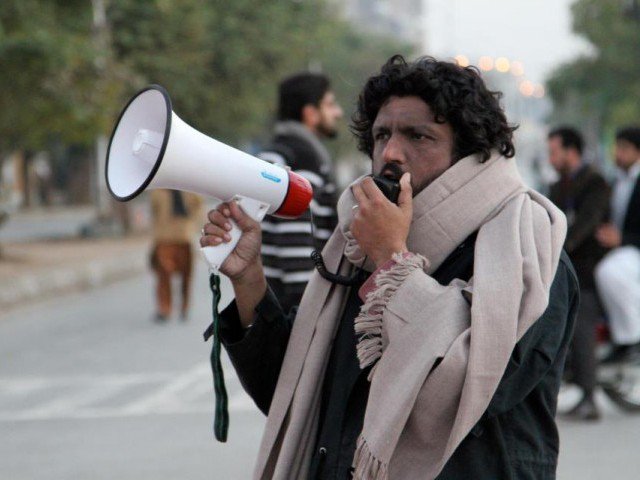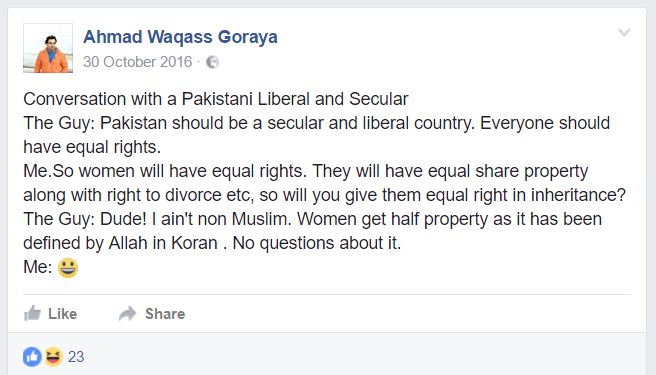Update 28 January 2017: The five activists and bloggers have now reportedly been released, however, they are alleged to have been tortured and forced to sign papers preventing them from bringing charges.
At least five men all of whom were known as secular, liberal social activists went missing in Pakistan in the past few weeks.
In this post we collect information about those missing. Sources include media reports as well as activist contacts.
The missing activists
| Ahmad Waqass Goraya (or Waqas Goraya) Disappeared: Wed 4 January Facebook: facebook.com/AWGoraya |
 |
| Asim Saeed Disappeared: Wed 4 January |
|
| Salman Haider (aka Sallu Bhai) Disappeared: Fri 6 January or Sat 7 January? Academic, playwright and poet Board member of Tanqeed magazine <tanqeed.org/> Urdu language blog: tanqeed.org/section/blogs/sallu-ka-blog/ Facebook: facebook.com/salman.zaheer.313 |
 |
| Ahmed Raza Naseer Reported missing: Sat 7 January A polio sufferer, Ahmed Raza uses a wheelchair, and was reportedly “taken away in front of his father without any trace of his whereabouts” |
|
| Samar Abbas Reported missing: Sat 7 January President of the Civil Progressive Alliance of Pakistan (CPAP), an anti-extremism group <facebook.com/CivilProgressive/> |
Note: Some sources report as many as nine missing activists (e.g. India Today), however only the names above seem to be in circulation as verified disappearances.
What do they write about?

Post from the Facebook page of Ahmad Waqass Goraya, critiquing the tendency of some self-described ‘liberals’ to put religious edicts before ethical principles
Common themes of the social media activists is criticism of social conservativism, of fundamentalist Islam, of religious hypocrisy, and of the embodiment of religion in law.
A columnist at The Nation notes:
All these social media activists had a set of things in common, they wrote openly on social media, their Facebook pages and blogs condemned the ever increasing rise in religious extremism, sectarianism and highlighted the plight of religious and ethnic minorities often with their fearless poetry, political satire and thought provoking blog posts.
… If speaking out against extremism is considered anti-Islam, if speaking out against intolerance is considered anti-Pakistan, if speaking out against human rights violations is considered anti-military, then I am sorry to say that our idea of nationalism is full of flaws. With such a delusional sense of patriotism we would only do more harm to this nation than good.
The wide range of broader human rights topics discussed includes criticism of Pakistan’s military, and the army has been implicated in massive human rights abuses, not least in Balochistan state in recent months and years.
Salman Haider in particular was known for condemning human rights violations including other abductions in Balochistan province. He served on the board of a bilingual online magazine, Tanqeed, known for highlighting state and policy failures, including concerns over military operations in Balochistan and northern tribal areas.
Official responses
Interior Minister Chaudhry Nisar Ali Khan briefed Senate house on measures taken to recover the disappeared, saying: “This government is not in the business of abducting people and we will not tolerate such disappearances while we are in power.” A Joint Investigation Team (JIT) was constituted Tuesday (10 January) to probe Salman Haider’s disappearance.
The UN Special Rapporteur on Freedom of Expression has urged Pakistan to locate and return home the activists (this was 11 January, when four were confirmed missing). David Kaye said:
“No government should tolerate attacks on its citizens… By making the investigation of these disappearances an urgent priority, the Pakistani authorities can send a strong signal that they take seriously the responsibility for the life and security of all of its citizens, particularly in cases involving freedom of expression.”
While parliament continues to discuss and demand action, the Human Rights Commission of Pakistan (HRCP) gave a countrywide call for protests and the release of the activists:
“[The activists] are known for airing their views, sometime critical of authority, extremism and intolerance, on social media… Pakistan has never been a particularly safe country for rights activists. Many have been killed, injured, abducted and threatened for their work… The events of the last week demonstrate that the dangers already extend to digital spaces…
“Threats and violence have never deterred Pakistan’s activists from speaking their mind and flagging issues that conscious citizens must raise in a civilized society. We know that the events of the last few days, will not change that. At the same time, however, HRCP also implores the government to wake up to its obligation to provide a safe environment for human rights defenders and activists.”
Who is to blame?
Various groups have been touted as possible perpetrators of the disappearances, including: a faction of the military responding to criticism of the army, other government security services cracking down on pro-secular, pro-liberal, or anti-army sentiment, or radical Islamist groups responding to supposed ‘insult to religion’.
Potentially linking the disappearances more to their criticism of religion than to the military, UN Special Rapporteur David Kaye raised Pakistan’s horrendous ‘blasphemy’ law, saying:
“Free expression campaigners and experts have long called for the abolition of criminal blasphemy provisions in Pakistan, which may carry the death penalty… Not only are such laws incompatible with international human rights law, but they also facilitate threats by state and non-state actors seeking to target expression.”
It is true that the bloggers have been accused of ‘insulting religion’ or perceived ‘blasphemy’. However, unexplained and unclaimed disappearances are not usually the modus operandi of radical or terrorist organisations. Such groups like to claim responsibility and make clear why they were targeting someone. The lack of information and the lack of evidence surrounding any of the presumed abductions may suggest that professional, institutional actors are more likely.
Pakistan’s intelligence agencies have a history of illegal detentions and of not notifying relatives about where they are or why they are being held. However, such “forced disappearances” are usually directed against those suspected of involvement in terrorism or violent separatism.
The Diplomat explains how online and activist attention has focused on security services, despite censorship:
Pakistan’s implicit censorship code restrains TV news channels from directly blaming the security forces for such incidents, and thus Haider’s disappearance couldn’t get the coverage it deserved. Print and social media outlets, on the other hand, are still doing their best to keep the issue alive and maintain pressure on the security agencies for Haider’s recovery. Also, large groups of people have organized protests in various cities demanding Haider’s safe return.
Raza Rumi, who left Pakistan in 2014 after being attacked by gunmen who shot his driver dead, told AFP: “the state has controlled TV and now they’re focusing on digital spaces.” In a tweet he further seemed to lay blame at the feet of the government itself, saying: “Government of Pakistan you cannot do this”, and:
When a state/society is threatened by unarmed, peaceful activists on #socialmedia & tolerate armed jihadists, what do you call it? Madness? https://t.co/xBD9Z7dyyp
— Raza Ahmad Rumi (@Razarumi) January 8, 2017
Indeed, it is also reported that, while Haider was prominent and his output more difficult to expunge, the Facebook pages of the other activists have been deleted. Haider, Goraya and Saeed “are related to different [social media] pages, which primarily did satire and commentary on religious and political issues but they were not really instigating people to treason,” Jibran Nasir, a lawyer and a social activist, told TRT World. Furthermore, he said the level of coordination (abducting four activists from three cities over a few days) was potentially too sophisticated for non-state actors. “…the fact that Facebook pages of these activists have been taken over by new admins and all the content that we see is pro-state… gives the impression that some state body is involved.” Two of the disappeared activists had arrived in Pakistan only recently, which state agencies would know and be able to act on quickly.
IHEU statement
President of the International Humanist and Ethical Union (IHEU) Andrew Copson, said:
“We are shocked and deeply concerned by these enforced disappearances. These are gentle, principled men, who express in satire or poetry and other writing their views which are variously secularist, humanist, or liberal. These are legitimate views and must be permitted in the public sphere, including online.
“The level of sophistication in these abductions strongly suggests involvement by institutions of state or security services. While it would be wrong to point the finger at government as a whole or at any individual parliamentarian, nevertheless the other organs of the state have the utmost responsibility to root out the perpetrators, however close to power they might turn out to be.”